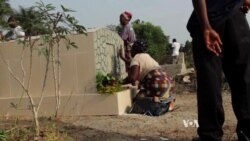Last August, as Ebola ravaged Liberia, Joe F. Kaisuah died at age 58.
Today, at a cemetery in Harbel city in Margibi County, Kaisuah’s sister kneeled in front of his gravestone and grasped it. Crying, she felt too weak to say anything, but his son, Friday Kaisuah, found a few words.
“All I can say, I am happy to be able to stay, to come this morning and talk with my father’s grave. It is a happy day for me because for us we never expected him to have a grave. But through the mercy of God we were able to have here a grave," Friday Kaisuah said.
On Decoration Day, Liberians visit cemeteries to clean dead relatives’ graves and spend time with memories of the departed. But Ebola has changed the observance this year.
Emotional day
Some people’s relatives have no graves -- they were cremated to stem the Ebola epidemic, while others have decided to stay home to avoid possible exposure to the virus at the grave sites.
The Ebola epidemic killed nearly 10,000 people in West Africa, including more than 4,000 in Liberia.
At Harbel’s cemetery, some people stand quietly near tombs while others collapse to the ground.
Kortu Koilor, a pastor in the community, said some people have not had enough time to digest the loss of their loved one in the epidemic.
“Today’s memorial day is a bit different, being that there are others who have died of Ebola, and the death was so sudden. We see that these people died one after another in their large number. And so coming to decorate or to remember them today is so saddening," Koilor said.
No graves
But there are also many Liberians who have no place to visit family members lost in the outbreak.
Emma David, 51, sits alone in her house in Unification City. She said her husband was cremated after dying in an Ebola treatment facility in Monrovia. She never saw him again, once he entered the health facility, and doesn't know what happened to his cremains.
“Every day, I went there [Ebola facility]. They told me I could not see him. We only spoke on the phone, throughout the day. After I left there ... they called me and said he had passed. We had communicated that very afternoon. He told me he was feeling much better," David remembered.
The shelves are empty in the little shop at the front of their house. Emma's husband, Samuel, had been the breadwinner of the family of eight. Emma David remembered him as a warm and loving person whom she had met years ago in church.
Her sisters, though, provided some company on a difficult day for her. They cooked beef and collard greens outside, on the porch.
Emma David said she might soon create her own place to commemorate her husband and put some flowers, but not today.














